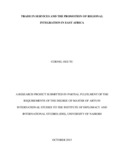| dc.description.abstract | This paper analyzes trade in services and the promotion of regional integration in East Africa. The main objective of this study was to examine the overall performance of trade in services to promote regional integration in East Africa. The specific objectives of the study were to : Interrogate the key players in trade in services to strengthen regional integration processes in EAC; Examine the existing gaps that contribute to poor performance in the provision of services in EAC and ; Examine the major steps taken by the East Africa Community to improve trade in services in Eastern Africa. The theoretical framework underpinning this study is functionalism. The theory examines the state centric and politics that goes beyond the state giving birth to regional integration where countries shed off their borders to allow for free trade. This happens when a country merges in mutual agreement with others in their geographical setting. The EAC is the perfect arrangement where functionalist approach to international cooperation is to lead to a political federation coupled with institutional framework to guide it. These frameworks act as a guiding principle to enhance trade in services. The research methodology involved gathering relevant data from the specified documents and literature review from the recent studies conducted in the areas of trade in services in order to analyze the material and arrive to a conclusion in the services sector in trade. Primary data was supplemented by secondary data obtained from a wide range of sources including library resources, articles, newspapers, journals, theses and internet sites. The data presented was critical to determine the existing knowledge on the topic under study. The research design was a mixed method of qualitative and quantitative data used for data collection and analysis. The study was carried out in the Kenya, Tanzania, Rwanda, Burundi and Uganda. The data collection methods included structured and unstructured questionnaires and data was analyzed through machine-processed Statistical Package of Social Scientists (SPSS). The findings indicate that trade in services have promoted to a greater extent regional integration in EAC. The services that are vibrant are Business, Financial and Technological services. The MNCs were found to exert very strong influence in the provision of services and regional integration. Some of the gaps identified included lack of proper infrastructure and unavailability of adequate manpower and human resource required for the provision of specific services such as social services and health-care. Most governments still have protectionist policies which undermine business and integration efforts. Measures were also proposed to improve trade in services in the region including capacity building to custom official, strong policies etc. The study also revealed capacity-building measures recommended for immigration/customs officers and other key stakeholders to improve regional integration and they include; professional training in regional integration and foreign protocols, staff exchange visits to learn more on good replicable practices, training on policies and laws of other nations to ensure harmony in application. | en_US |

